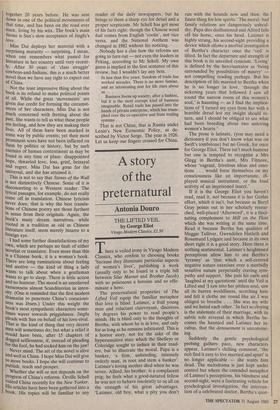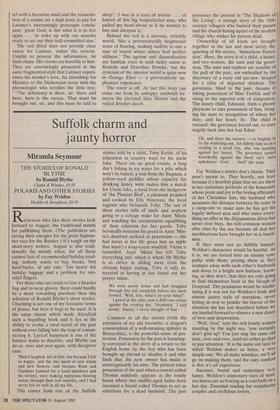A story of the preternatural
Antonia Douro
THE LIFTED VEIL by George Eliot Virago Modern Classics, £2.50 There is veiled irony in Virago Modern Classics, who confess to choosing books `because they illuminate particular aspects of women's lives', publishing a work (usually only to be found in a triple bill between Silas Marner and Brother Jacob) with so poisonous a heroine and so effe- minate a hero.
The preternatural properties of The Lifted Veil equip the familiar metaphor that love is blind. Latimer, a frail young man and reluctant clairvoyant, discovers by degrees his power to read people's minds. He is blind only to the thoughts of Bertha, with whom he is in love, and only for as long as he remains infatuated. This is a horror story, not for the sake of the hypersensitive state which the Shelleys or Coleridge sought to induce in their read- ers, but to illustrate the moral. Papa is a banker, 'a firm, unbending, intensely orderly man, in root and stem a banker'. Latimer's loving mother died when he was seven. Alfred, his brother, is a complacent prig; he feels what a good-natured fellow he was not to behave insolently to us all on the strength of his great advantages. `Latimer, old boy, what a pity you don't run with the hounds now and then, the finest thing for low spirits.' The moral: bad family relations are dangerously unheal- thy. Papa dies disillusioned and Alfred falls off his horse, onto his head. Latimer is highly strung, his second-sight providing a device which allows a morbid investigation of Bertha's character once the 'veil' is lifted. In fact the departure and strength of this book is its unveiled cynicism. 'Living' is defined by the hero/narrator as 'being surrounded by possibilities of misery' not compelling reading perhaps. But his description of life married to Bertha when he is no longer in love, 'through the sickening years that followed I saw all round the narrow room of this women's soul,' is haunting — as I find the implica- tions of 'I turned my eyes from her with a horrible dread lest my insight should re- turn, and I should be obliged to see what had been breeding about two unloving women's hearts.'
The prose is latinate, (you may need a dictionary if you don't know what was on Swift's tombstone) but no Greek, for once for George Eliot. There isn't much humour but one is tempted to recognise a Mrs Glegg in Bertha's aunt, Mrs Filmore, whose `vagrant, frivolous ideas and emo- tions . . . would force themselves on my consciousness like an importunate, ill- played musical instrument, or the loud activity of an imprisoned insect.'
If it is the George Eliot you haven't read, read it, not because it is her Gothic effort, which it isn't, but because as Beryl Gray points out in her scholarly resear- ched, well-placed 'Afterward', it is a fasci- nating complement to Mill on the Floss which she was writing at the same time. Read it because Bertha has qualities of Maggie Tulliver, Gwendolen Harleth and Rosamund Lydgate and because in its own short right it is a good story. Here there is nothing sentimental. Latimer's heightened perceptions allow him to see Bertha's `tyranny' as 'that which a self-centred negative nature exercises over a morbidly sensitive nature perpetually craving sym- pathy and support.' She pats his curls and `laughed at my quotations' until the Veil is Lifted and 'I saw into her pitiless soul, saw all its barren worldliness, scorching hate and felt it clothe me round like air I was obliged to breathe . . . She was my wife and we hated each other.' In fact so cloying is the stalemate of their marriage, with its subtle role reversal in which Bertha be- comes the haunted and Latimer her in- cubus, that the denouement is unconvinc- ing.
Suddenly the gentle psychological probing gathers pace, new characters appear, Latimer's chilling comment, 'the rich find it easy to live married and apart' is no longer applicable — she wants him dead. The melodrama is just kept under control but where the extended metaphor of Latimer's perceptions, his blindness and second-sight, were a fascinating vehicle for pyschological investigation, the interven- tion of a celebrated doctor, Bertha's guar- rel with a favourite maid and the resuscita- tion of a corpse are a high price to pay for Latimer's interestingly grotesque conclu- sion: 'great God, is this what it is to live again . , to wake up with our muscles ready to act out their half-committed sins.'
The veil lifted does not provide clear vision for Latimer, rather the reverse. Unable to process the information, he finds chaos. His visions are horrible to him. They are convincingly presented in the same fragmented style that Latimer experi- ences his mother's love, his friendship for Meunier or the Dickensian scene with the phrenologist who terrifies the little boy.
"The deficiency is there, sir, there and here, here is the excess. That must be brought out, sir, and this must be laid to sleep". I was in a state of tremor . . . of hatred of this big bespectacled man, who pulled my head about as if he wanted to buy and cheapen it.'
Behind the veil is a nervous, irritable world, 'like a preternaturally heightened sense of hearing, making audible to one a roar of sound where others find perfect stillness.' The egoism and dissatisfaction are familiar even in such sickly saints as Romola and Dorothea Brooke, but the cynicism of the interior world is quite new in George Eliot — a provocatively un- pleasant experience.
The cover is off. At last this story can come out from its unhappy sandwich be- tween the elevated Silas Marner and the veiled Brother Jacob.











































 Previous page
Previous page